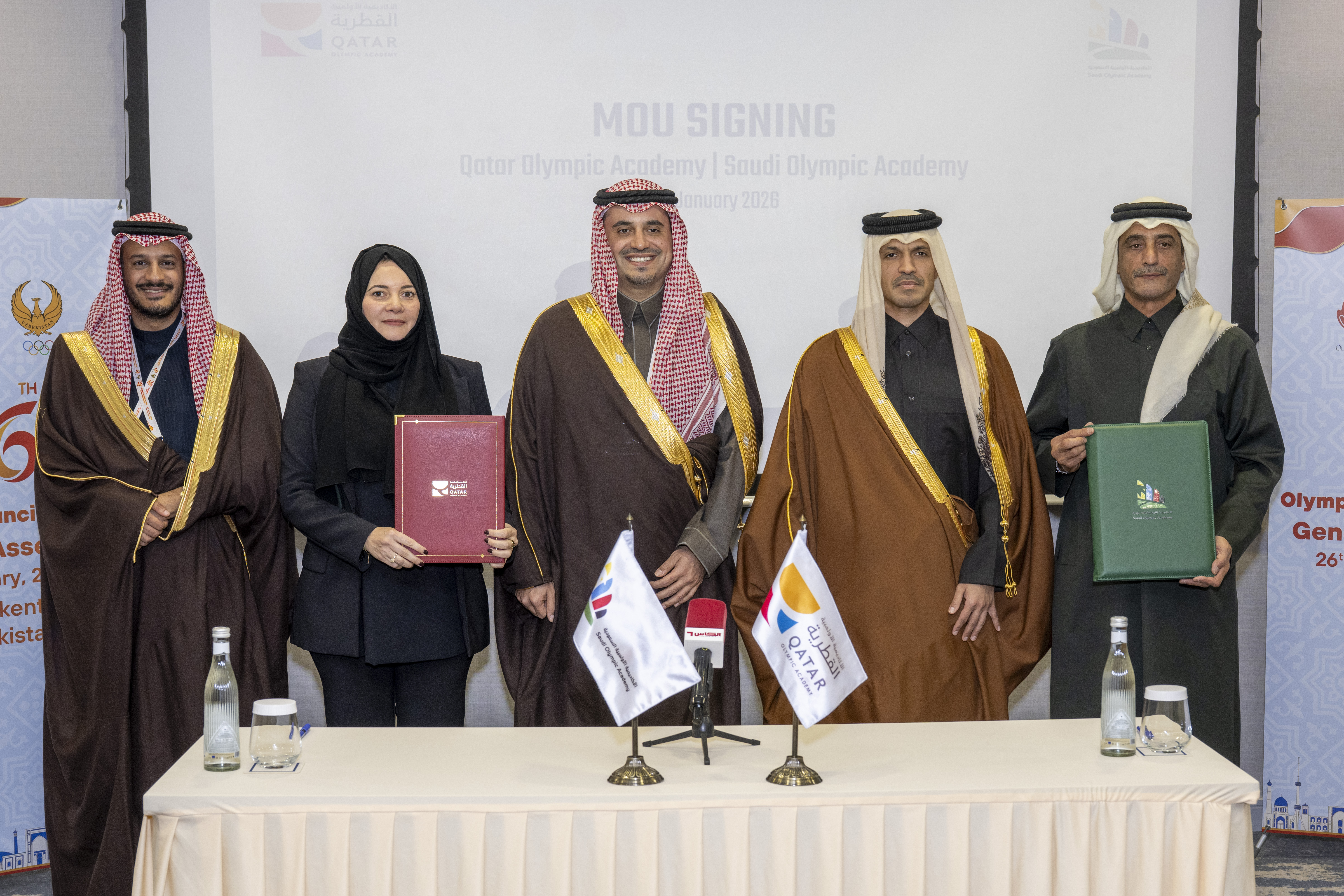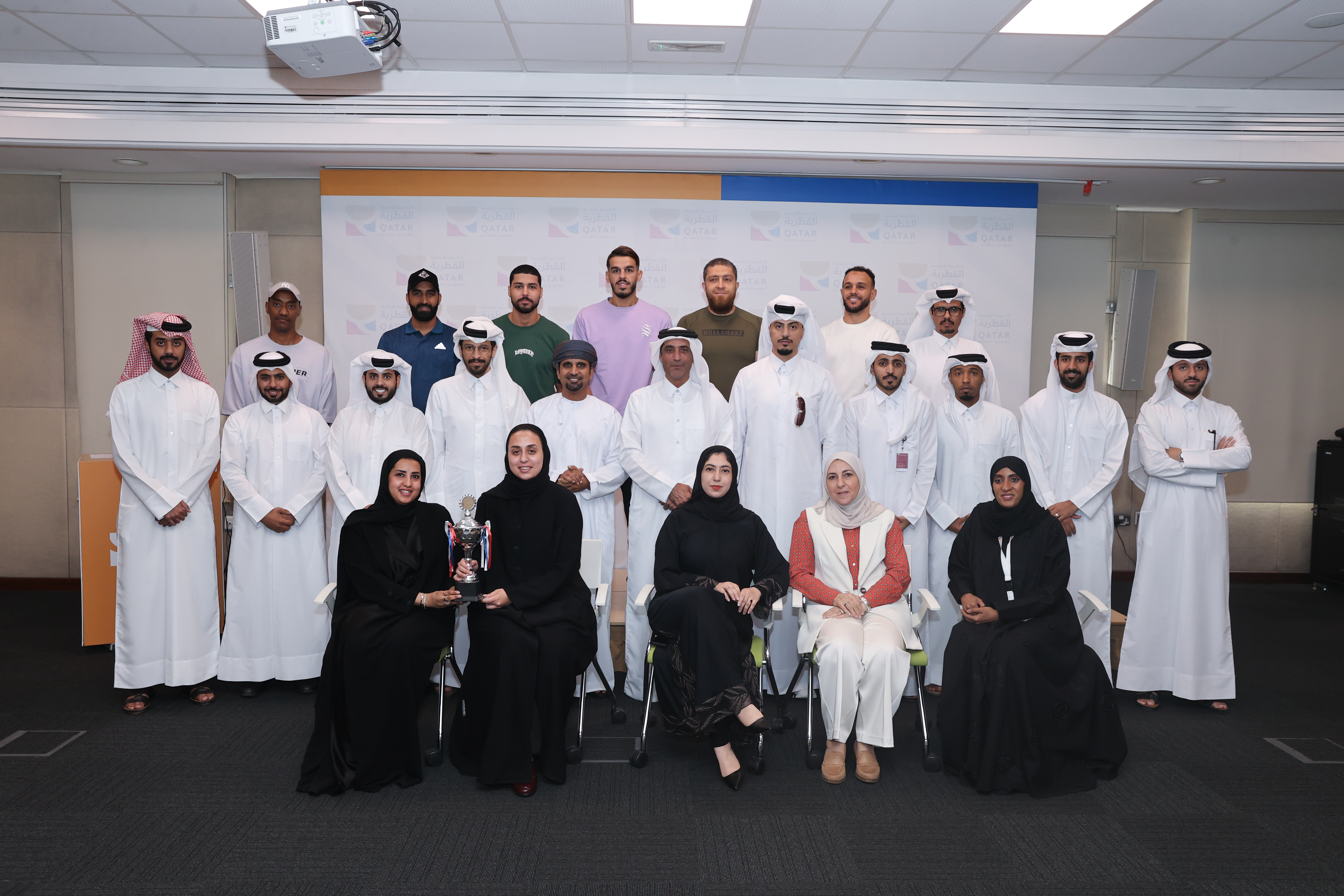This course serves as the first qualifying stage for participants to enroll in the Advanced Diploma in Sports and Olympic Institutions Management, which the academy organizes each year. The diploma program attracts significant interest from students keen on sports administration, both from within Qatar and abroad. Many sports leaders from the region, particularly the Gulf Cooperation Council (GCC) countries, have graduated from this program.
The course ran for five days, from April 27th to May 1st, with around 35 participants from Qatar and other countries. Attendees came from various sports, administrative, technical, and specialized backgrounds, including international referee Abdullah Al-Adhaba, Mahmoud Abu Nada (goalkeeper for Al-Arabi Club), Mohammed Abdullah (goalkeeper for Al-Shahaniya Club), and Mohammed Jumaa Al-Alawi (player for Mesaimeer Club).
The course was delivered by Prof. Hisham Al-Adwani, Vice President of the Omani School Sports Federation, Director of the Sports Management Diploma Program at the IOC, and an internationally certified lecturer in sports management. He has held numerous administrative positions in Omani sports.
At the beginning of the program, Al-Adwani discussed the concepts of sports management, defined as the art of coordinating work elements and sports production within sports organizations to achieve their goals. He emphasized the importance of setting clear objectives and other key elements that form the foundation of successful sports administration.
He then covered the history of the Olympic Movement and the modern Olympic Games. The ancient Olympics were held in Olympia, Greece, from the 8th century BC to the 5th century AD. The modern Summer Olympics, as we know them today, began in 1896 under the initiative of Frenchman Pierre de Coubertin, founder of the modern Olympic Movement and then-president of the IOC. The first modern Games featured 241 athletes from 14 nations competing in nine sports and 43 events.
The Olympics were suspended during World War I and World War II but later evolved in the 20th century with the introduction of the Winter Olympics for ice and snow sports, the Paralympics for athletes with disabilities, and the Youth Olympics.
Social, economic, and technological changes transformed the Olympics from an amateur-only event to one open to professionals, increasing media attention and corporate sponsorship.
Al-Adwani also discussed Olympic symbols, the Olympic Charter, and Olympic values. The Olympic Charter serves as the constitution of the Olympic Movement, governing the organization of the Games and the regulations set by the IOC. Disputes over interpretation or implementation are resolved by the IOC Executive Board or, in some cases, by the Court of Arbitration for Sport (CAS), established in 1993 as an independent body with 20 arbitrators.
On the fourth day, the lecture focused on administrative skills and steps to develop sports and administrative personnel, which positively impact the achievements of sports federations in both professional and community sports.
The final day covered planning and resource management in sports institutions, followed by an assessment of the participants' learning over the five-day course.
This course is the first qualifying part of the Sports Management Diploma Program. The academy will launch the second qualifying course, "Modern Management of Olympic Sports Institutions," at the end of November. It will cover key topics such as effective communication, workplace management, time management, technical management, event management, and human resource management.
More news

Qatar Olympic Academy Celebrates Graduation of Postgraduate Program Participants
Doha – February 17, 2026: Under the patronage of His Excellency Sheikh Joaan bin Hamad Al Thani, President of the Qatar Olympic Committee and Chairman of the Qatar Olympic Academy, the Academy celebrated this morning the graduation of students from its postgraduate programs at the headquarters of the Qatar Olympic Committee.

Qatar Olympic Academy Concludes Course on “Physical Activity and Autism”
Doha – February 2026: The Qatar Olympic Academy has concluded its five-day course on “Physical Activity and Autism”, held from February 1 to 5 at the Academy’s headquarters. The program witnessed wide participation of more than forty male and female trainees from inside and outside Qatar, representing diverse professional and academic fields related to physical education, sports training, special education, and the humanities, in addition to a number of parents of children with Autism Spectrum Disorder (ASD).

Qatari Olympic Academy Signs Memorandum of Understanding with Saudi Olympic Academy
Tashkent - Uzbekistan – January 26, 2026: The 46th Asian Olympic Council meeting in Tashkent, Uzbekistan, witnessed the signing of an important memorandum of understanding between the Qatari Olympic Academy and the Saudi Olympic Academy, in a step that enhances regional and Gulf sports cooperation. The agreement, signed by the Qatari Olympic Academy with the Saudi Olympic Academy, aims to strengthen cooperation in the field of developing sports training cadres.

